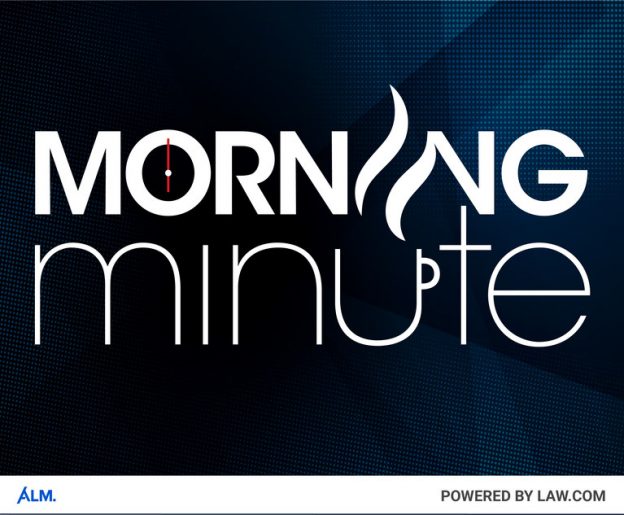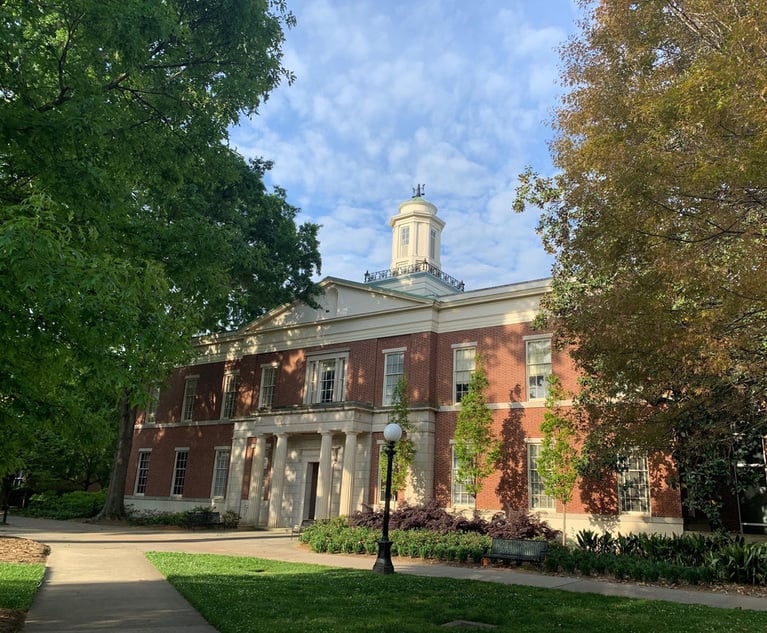Litigation Work Is Migrating From Big Law to Midsize Firms: The Morning Minute
The news and analysis you need to start your day.
November 10, 2022 at 06:00 AM
6 minute read

Want to get this daily news briefing by email? Here's the sign-up.
WHAT WE'RE WATCHING
LITIGATION MIGRATION - For years, the richest law firms have been getting even richer, increasing the profit gap between themselves and others and forcing smaller law firms to join forces or wither on the vine. But, according to the latest Law Firm Financial Index from Thomson Reuters, law firms beyond the Am Law 200 (defined as midsize firms in the report) saw an increase in overall demand during the third quarter, relative to the same time last year, while Am Law 100 and Second Hundred firms saw declines. So then, are we finally seeing that gap starting to shrink? Nope! That said, however, what we are seeing is demand for certain types of work—namely, labor and employment (up 2%) and litigation (up about 1.5%), according to the Thomson Reuters study—shifting to smaller firms that can potentially offer more value. Jim Jones, a former managing partner of Arnold & Porter and now senior director of Ethics and the Legal Profession at Georgetown University Law Center, noted to Law.com's Andrew Maloney that litigation demand is down in the largest firms but up in the midsize firms. "That's telling you the market is moving litigation down-market to smaller firms, relatively speaking. And why is that? It's about cost," Jones said. "It's the fact that, if a corporation moves a litigation matter from an Am Law 100 to an Am Law Second Hundred, just that movement can save them 25% to 30% on fees. And if you get good lawyers in smaller firms—and there are great ones—why wouldn't you do that?"
PAY WARS - Fierce competition among law firms for talent continues to drive up starting salaries, which, thanks to a new law in the books in New York City, could create some fierce competition within those firms as well. Local Law 32, which became effective this month, requires companies with more than four employees to list salary minimums and maximums for any publicly posted positions that will (or could) work in the Big Apple. As Law.com's Patrick Smith reports, the law will likely create some dissonance when existing employees find out how much potential new employees might make. And for an industry that loves to talk about its culture, this should be a point of concern, particularly for small and midsize firms. While the law may have little effect on associates at the largest firms who receive pay in lockstep, smaller firms may face retention challenges for their staff as well as associates and other attorneys who are not paid in lockstep. "Small- and medium-sized firms may struggle with pay compression," where new employees are paid higher starting salaries than existing employees in the same or similar position because of perceived pressure on firms to be more competitive, Ren Tucker, CEO of Maverick Search and Consulting, told Smith.
WHO GOT THE WORK?℠ - Werfen, a specialized diagnostic instruments developer and manufacturer, has agreed to acquire Immucor Inc. from TPG Capital for approximately $2 billion in a deal guided by Ropes & Gray and Milbank. The transaction, announced Nov. 3, is expected to close in the first half of 2023. Barcelona, Spain-based Werfen is advised by Milbank. The Milbank team was led by partners Tim Peterson, Francisco Nunez and Neil Whoriskey. TPG Capital, which is based in San Francisco, California, is represented by a Ropes & Gray team led by private equity partners Michael Roh and James C. Davis. >> Read the filing on Law.com Radar and check out the most recent edition of Law.com's Who Got the Work?℠ column to find out which law firms and lawyers are being brought in to handle key cases and close major deals for their clients.
ON THE RADAR - Hogan Lovells filed a defamation lawsuit Wednesday in Texas Southern District Court on behalf of NSK Ltd. and NSK Corp. The complaint accuses Intercontinental Terminals Co. of disparaging NSK via a fabricated analysis report concerning a large fire which occurred over the course of days in 2019 and caused hundreds of millions of dollars in damages. The suit asserts that the report falsely identifies an NSK product as the cause of the fire, yet the fire was actually caused by chemicals released from an Intercontinental storage facility. Counsel have not yet appeared for the defendant. The case is 4:22-cv-03910, NSK Ltd. et al v. Intercontinental Terminals Company LLC. Stay up on the latest deals and litigation with the new Law.com Radar.
EDITOR'S PICKS
This content has been archived. It is available through our partners, LexisNexis® and Bloomberg Law.
To view this content, please continue to their sites.
Not a Lexis Subscriber?
Subscribe Now
Not a Bloomberg Law Subscriber?
Subscribe Now
NOT FOR REPRINT
© 2025 ALM Global, LLC, All Rights Reserved. Request academic re-use from www.copyright.com. All other uses, submit a request to [email protected]. For more information visit Asset & Logo Licensing.
You Might Like
View All
GOP Now Holds FTC Gavel, but Dems Signal They'll Be a Rowdy Minority
6 minute read
'Serious Legal Errors'?: Rival League May Appeal Following Dismissal of Soccer Antitrust Case
6 minute read
28 Firms Supporting Retired Barnes & Thornburg Litigator in Georgia Supreme Court Malpractice Case
7 minute read
How Some Elite Law Firms Are Growing Equity Partner Ranks Faster Than Others
4 minute readLaw Firms Mentioned
Trending Stories
- 1Reed Smith Welcomes New Chief Marketing & Business Development Officer
- 2Ticket-Fixing Scheme Results in Western NY Judge's Resignation—for a Second Time
- 3Legal Community Mourns the Loss of Trailblazing Judge Dorothy Chin Brandt
- 4Delaware Supreme Court, Reversing Chancery, Lowers Review Standard for TripAdvisor Move to Nevada
- 5Haynes and Boone Expands in New York With 7-Lawyer Seward & Kissel Fund Finance, Securitization Team
Who Got The Work
J. Brugh Lower of Gibbons has entered an appearance for industrial equipment supplier Devco Corporation in a pending trademark infringement lawsuit. The suit, accusing the defendant of selling knock-off Graco products, was filed Dec. 18 in New Jersey District Court by Rivkin Radler on behalf of Graco Inc. and Graco Minnesota. The case, assigned to U.S. District Judge Zahid N. Quraishi, is 3:24-cv-11294, Graco Inc. et al v. Devco Corporation.
Who Got The Work
Rebecca Maller-Stein and Kent A. Yalowitz of Arnold & Porter Kaye Scholer have entered their appearances for Hanaco Venture Capital and its executives, Lior Prosor and David Frankel, in a pending securities lawsuit. The action, filed on Dec. 24 in New York Southern District Court by Zell, Aron & Co. on behalf of Goldeneye Advisors, accuses the defendants of negligently and fraudulently managing the plaintiff's $1 million investment. The case, assigned to U.S. District Judge Vernon S. Broderick, is 1:24-cv-09918, Goldeneye Advisors, LLC v. Hanaco Venture Capital, Ltd. et al.
Who Got The Work
Attorneys from A&O Shearman has stepped in as defense counsel for Toronto-Dominion Bank and other defendants in a pending securities class action. The suit, filed Dec. 11 in New York Southern District Court by Bleichmar Fonti & Auld, accuses the defendants of concealing the bank's 'pervasive' deficiencies in regards to its compliance with the Bank Secrecy Act and the quality of its anti-money laundering controls. The case, assigned to U.S. District Judge Arun Subramanian, is 1:24-cv-09445, Gonzalez v. The Toronto-Dominion Bank et al.
Who Got The Work
Crown Castle International, a Pennsylvania company providing shared communications infrastructure, has turned to Luke D. Wolf of Gordon Rees Scully Mansukhani to fend off a pending breach-of-contract lawsuit. The court action, filed Nov. 25 in Michigan Eastern District Court by Hooper Hathaway PC on behalf of The Town Residences LLC, accuses Crown Castle of failing to transfer approximately $30,000 in utility payments from T-Mobile in breach of a roof-top lease and assignment agreement. The case, assigned to U.S. District Judge Susan K. Declercq, is 2:24-cv-13131, The Town Residences LLC v. T-Mobile US, Inc. et al.
Who Got The Work
Wilfred P. Coronato and Daniel M. Schwartz of McCarter & English have stepped in as defense counsel to Electrolux Home Products Inc. in a pending product liability lawsuit. The court action, filed Nov. 26 in New York Eastern District Court by Poulos Lopiccolo PC and Nagel Rice LLP on behalf of David Stern, alleges that the defendant's refrigerators’ drawers and shelving repeatedly break and fall apart within months after purchase. The case, assigned to U.S. District Judge Joan M. Azrack, is 2:24-cv-08204, Stern v. Electrolux Home Products, Inc.
Featured Firms
Law Offices of Gary Martin Hays & Associates, P.C.
(470) 294-1674
Law Offices of Mark E. Salomone
(857) 444-6468
Smith & Hassler
(713) 739-1250








